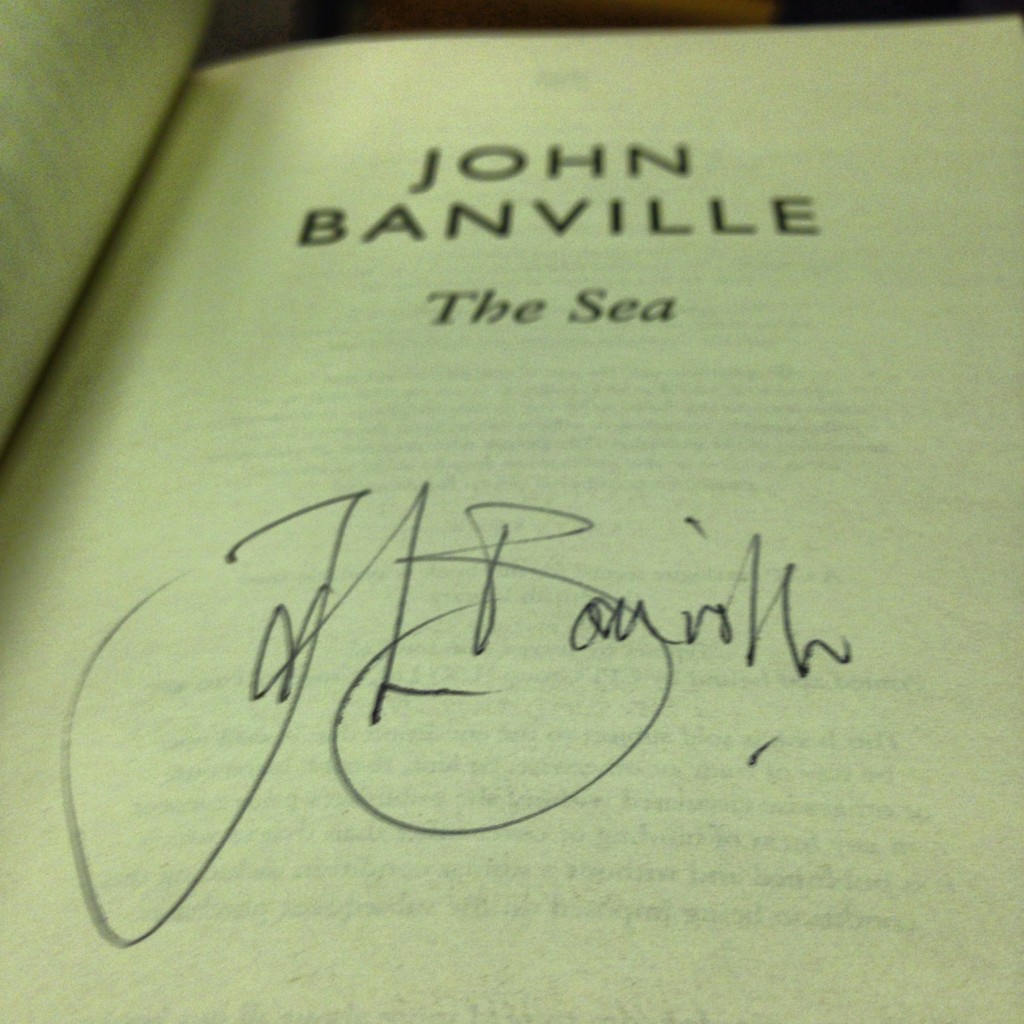Last night I went to hear John Banville speak at George Washington University. He was interviewed by their writer-in-residence, Molly McCloskey. I went to see him (and even ducked out of Ed Perlman’s vaunted Sentence Power class) not only because I admire Banville’s writing, but also because I needed a kick in the creative ass. During the hour-long discussion, I jotted down notes from what he said, as best as I could.
I’m not sure what disclaimers I need to throw in here, lest I be accused of misquoting the man, but I will say that neither my penmanship nor my transcription skills are perfect. I just really loved what he had to say, and wanted to share the most interesting points with any other struggling writers out there.
Background: John Banville is an Irish author. His book, The Sea, won the Booker Prize in 2005…among many other accomplishments. He also writes crime fiction under the pen name Benjamin Black…that bit of info is important to know before continuing.
* * * *
Does it get easier, your craft of writing?
I hate to tell this to all of you young writers out there, but it gets harder as you get older.
I always say that the world is round but language is square—language is always trying to have its own say, kind of like Jacob wrestling with the angel. The command of detail, if you practice it long enough, you do acquire a faculty—but the danger is that it becomes facile. Writing always needs to be difficult. If it’s not difficult, it’s not worth doing.
After three decades, does the same impulse drive you to write?
Every morning I sit down and say, “I can’t do this. I don’t know how to do this.” I sit there, fill my ink, drink my decaf Nespresso….by mid-afternoon, I’m so lost in conversation [maybe he said “concentration” but this is what I wrote] that I cease to exist. Sentences generate sentences. Banality in the morning, and by the end of the day I hope to have some luminosity that I didn’t intend to get.
It once took me three days to write three paragraphs. I can’t rush it. It’s a bit like [the board game] Snakes and Ladders: you change one word at the beginning of the paragraph and the rest wobbles. I always say that the greatest invention of humankind is the sentence.
Banville was asked about Irishness, and McCloskey made mention of an article he wrote for the NYT where he mentions identifying with the sound of a hurley stick hitting a sliotar while in Central Park.
The rhythms of the English language are not the same [from England to Ireland, in this case]. There is a wonderfully productive tension between the square language of English and the highly oblique and deflective Irish language. Irish is a means of poetic evasion. There is a sort of glory in the ambiguity of language…like how the word “cleave” can mean two completely opposite meanings.
I don’t like Irish sentimentality. Being Irish has nothing to do with “mist on the bog”. That’s sentimental claptrap that irritates and bores me. Yeats in 1924 once said, “We are no petty people” and that is true. I’m Irish because I write in the language that we developed. [He also recounted an amusing story of once escaping Ireland at Saint Patrick’s Day by heading to Sweden for an event with Roddy Doyle, and how even there they could not evade the clichés of being Irish, donning a green jumper, etc. It made me think that Carroll’s Irish Gift Shop in Dublin must be his own personal Hell.]
On formative experience:
A child should be loaded with as much trauma as possible [he is of course, kidding]. Catholicism I owe very much to, in terms of cultivating material. I believe that art rises out of obsession.
Humans are the strangest creatures. It’s constant amazement. I would always want to record my unfailing amazement at the world.
Has he ever abandoned a book?
No. They are constantly malleable. I could never start a new book if I had abandoned another.
We write the kind of books that we want to read. We aspire to write books that we want to admire…and of course we don’t succeed. The ideal reader is the non-reader. After I wrote The Sea, my wife was going through the checkout at Marks & Spencer and the teller told her to tell me that it was the most beautiful book that she had ever read. And she wanted my wife to make sure that I knew that she was not a reader. I write for the checkout lady at Marks & Spencer.
I want people to be surprised and delighted. What’s the point if it doesn’t intensify the delight of being alive?
I work in total confusion. I work in the dark, as Henry James once said. I love the constant sense of discovery. I’m an old snail leaving a constant trail of slime, and sometimes it glistens.
On writing as Benjamin Black:
Benjamin Black is my day job. I don’t believe that we are unitary beings. I don’t believe that we are one person and boring. A German reporter once asked me why I wrote cheap thrillers: “Why do you write this trash?”
I’ve had a day job for 35 years. It gave me freedom, and I don’t have to worry about selling books. Freelancing is terrifying. Benjamin Black is not an artistic venture; he’s more of a craftsman (I hope). I write as Benjamin Black in the summer, which to me is a time of deadness. I prefer winter, where you can feel the ground shaking with a desire to grow. Autumn has a rumbling of death but it is not really death. That’s the John Banville writing season.
Who do you turn to for inspiration?
Nobody. I turn to myself. I read little fiction nowadays, and I find that you don’t need it as much as you did when you were younger. I am horribly ignorant of world literature, and because my time is shorter, I have to read what I read.
When younger I felt that Nabokov, Beckett, et al. were miraculous. As I got older, I realized that their talents were not God given. That doesn’t make it less valuable; you just develop a different attitude about things.

